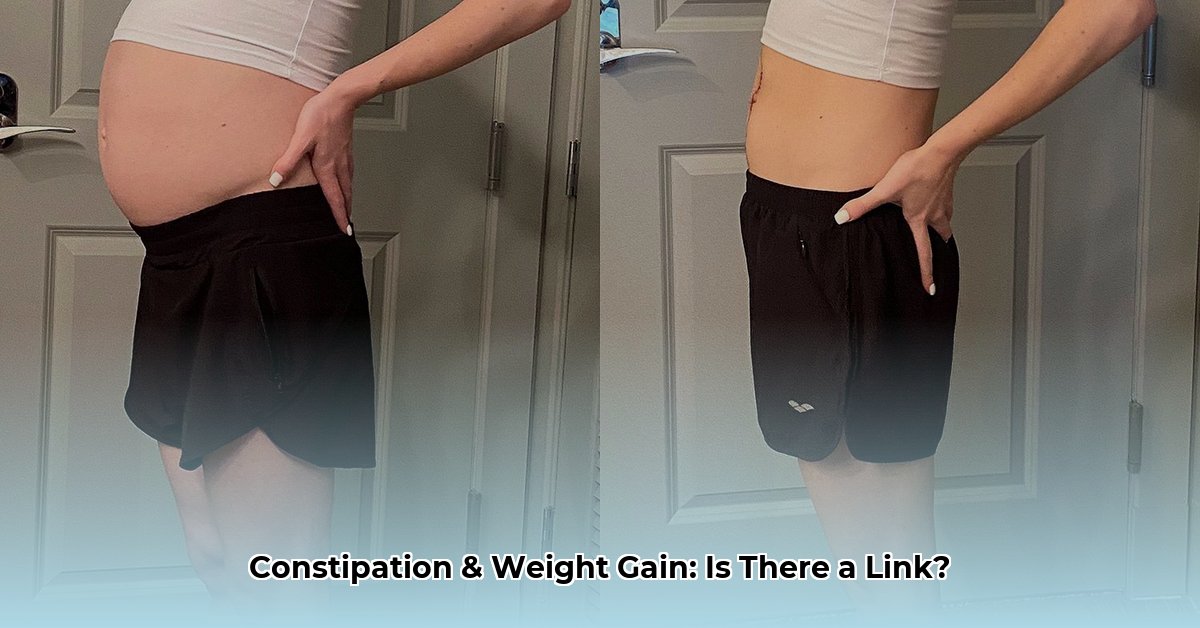The Connection Between Constipation and Weight
Feeling heavier than usual and suspecting constipation is the culprit? You’re not alone. Many people believe constipation directly causes weight gain, but the truth is more nuanced. While constipation itself doesn’t add fat to your body, it can definitely contribute to temporary weight fluctuations and that uncomfortable feeling of fullness. Let’s explore the connection.
Understanding Temporary Weight Gain
Constipation can lead to a temporary increase in the number you see on the scale. This isn’t actual fat gain, but rather the weight of the stool itself, plus any associated water retention. The average bowel movement can weigh a significant amount, and this accumulated waste naturally adds to your overall weight. Additionally, the trapped gas and stool can cause bloating, making you feel and look heavier. Think of it like a backed-up pipe: the contents are still there, adding weight, but they’re not a permanent part of the structure. Once you relieve the constipation, this extra weight will disappear.
Lifestyle Factors: The Common Link
Interestingly, lifestyle factors that often contribute to constipation also contribute to weight gain. A diet low in fiber, inadequate hydration, and a lack of physical activity can lead to both. For instance, a diet high in processed foods and low in fiber can slow down your metabolism, making it harder to lose weight, while simultaneously increasing your risk of constipation. It’s not a direct cause-and-effect relationship, but rather two separate consequences of the same underlying habits.
Steps to Relieve Constipation and Beat the Bloat
Ready to get things moving? Here’s a practical guide to help you find relief:
1. Prioritize Fiber:
Fiber is your digestive system’s best friend. It adds bulk to stool, making it easier to pass. Aim for 25-30 grams of fiber per day. Excellent sources include:
- Fruits: Berries, apples, pears, bananas
- Vegetables: Broccoli, spinach, carrots, Brussels sprouts
- Whole Grains: Oats, brown rice, quinoa, whole-wheat bread
- Legumes: Lentils, beans, chickpeas
Increasing fiber intake can also support healthy weight management by promoting satiety and regulating blood sugar levels.
2. Hydrate Regularly:
Water is crucial for softening stool and preventing constipation. Aim for at least eight glasses of water a day. Dehydration can make stools hard and difficult to pass. Consider adding hydrating foods like watermelon and cucumber to your diet.
3. Move Your Body:
Regular physical activity stimulates bowel movements and can be as simple as a brisk walk or taking the stairs. Exercise helps the muscles in your intestines contract more effectively, moving stool through your system.
4. Manage Stress:
Stress can significantly impact your digestive system. Explore stress-reducing techniques like yoga, meditation, or spending time in nature.
5. Consider Probiotics and Prebiotics:
Probiotics introduce beneficial bacteria into your gut, potentially improving gut health and regularity. Prebiotics, found in foods like onions, garlic, and bananas, feed these beneficial bacteria. Research suggests these can positively influence gut motility.
6. Use Laxatives Judiciously:
If lifestyle changes aren’t providing enough relief, consider over-the-counter laxatives. However, consult your doctor or pharmacist before using them, especially for extended periods. Overuse can lead to dependence and other digestive problems. They can help you choose the right type and ensure safe usage. Different types of laxatives work in different ways:
- Bulk-forming laxatives: Add bulk to the stool, similar to fiber.
- Osmotic laxatives: Help the colon retain water, softening the stool.
- Stimulant laxatives: Encourage bowel contractions.
- Lubricant laxatives: Make stool easier to pass.
| Strategy | Benefit |
|---|---|
| Increase Fiber | Adds bulk to stool, promoting regularity |
| Hydrate Regularly | Softens stool, eases passage |
| Regular Exercise | Stimulates bowel movements |
| Manage Stress | Supports healthy digestive function |
| Probiotics/Prebiotics | May improve gut health and regularity |
| Laxatives (with caution) | Provides relief from constipation |
When to Seek Medical Attention
While occasional constipation is normal, consult a healthcare professional if you experience:
- Persistent constipation (lasting more than two weeks)
- Severe abdominal pain
- Blood in your stool
- Unexplained weight loss
- Pencil-thin stools
- A sudden change in bowel habits
The Emotional Impact of Bloating
Feeling bloated can be emotionally challenging, affecting body image and self-esteem. Remember, the bloating associated with constipation is usually temporary. Focus on addressing the underlying cause, and the bloating will likely subside. If you’re struggling with the emotional impact, consider talking to a therapist or counselor.
Ongoing Research and Future Directions
Research continues to explore the gut-brain connection and how various factors influence digestive health. Emerging areas of study include the role of the gut microbiome in constipation and the potential benefits of personalized dietary interventions. While current understanding suggests constipation does not directly cause significant weight gain, future research may reveal further nuances in this complex relationship.
Disclaimer: This information is for educational purposes only and should not be considered medical advice. Always consult with a qualified healthcare professional for any health concerns or before making any decisions related to your health or treatment.
- Adult Bento Box Lunch Ideas For Quick Healthy Portable Options - December 25, 2025
- Adult Bento Meal Ideas for Delicious, Easy, and Healthy Lunches - December 24, 2025
- Adult Bento Box Ideas for Delicious and Easy Lunches - December 23, 2025










